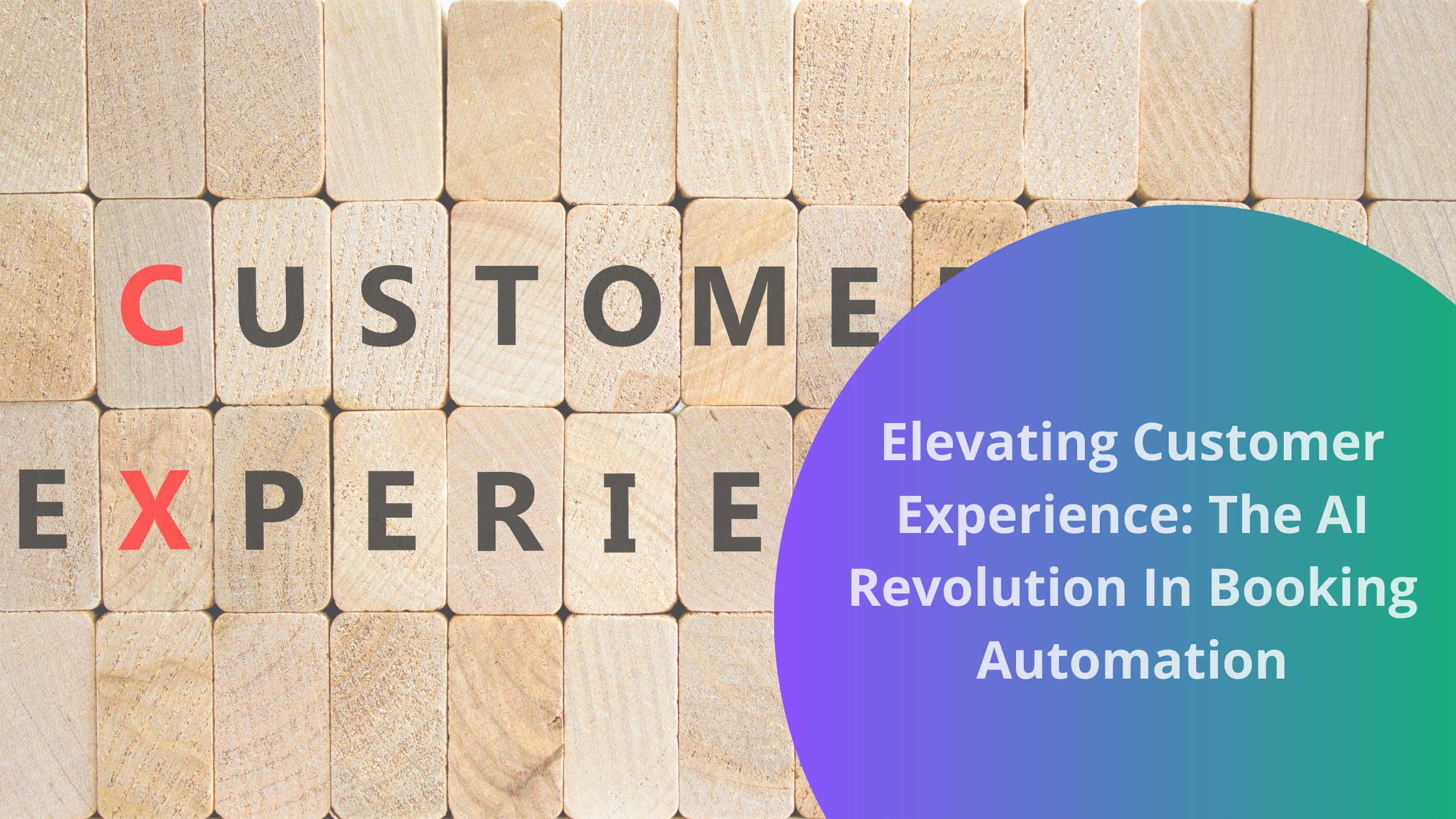The days of being tethered to a phone and navigating through touch-tone commands or manually scribbling details in an appointment book, just to book a service or secure reservation are behind us. We’ve transitioned from analog into digital; this narrative underscores not only our method for making bookings but also revolutionizes the fundamental aspects of customer interaction and service delivery. At presentᅳthe brink of another new eraᅳit is Artificial Intelligence (AI) that stands as leader in transforming booking processes.
From manual to digital booking systems: this evolution represents the initial leap towards convenience, efficiency and scalability. With digital platforms in place – they grant businesses unprecedented ease of management for appointments, reservations and services – a more connected world takes shape; accessibility becomes paramount. Yet with AI integration into these systemsᅳa process that propels us beyond mere convenienceᅳpersonalization emerges as standard procedure while good customer service and positive experience morphs into our ultimate measure for success.
As we reflect on the projection: by 2025, 95% of your customer interactions may be AI-powered – an imperative emerges to understand and optimize this impending shift in the entire customer journey itself. This insight illuminates not just the rapid pace at which technology evolves; but also underlines a clear understanding and compelling necessity for businesses: they must adapt, innovate in their customer engagement strategies.
The Role Of AI In Booking Automation
AI within these systems leverages two core technologies – machine learning and natural language processing. The heart of machine learning lies in teaching a computer to identify patterns, extrapolate from past data points, and formulate decisions based on this recognition; thus embodying the perfect example of predictive analytics.
For instance, your preferred brand or hotel room type becomes a piece of information that this system learns; it then suggests similar options in future searches. Utilizing natural language processing – an integral component to these operations – computers gain the ability to understand human patterns and commands, allowing you the convenience of booking rooms.
Indeed, the power of AI lies in its ability to understand your preferences and dislikes; this understanding enhances each subsequent booking experience. It performs exceptionally well in handling complicated bookings that could involve multiple destinations or services–and offers personalized recommendations as a significant convenience factor for you. This guarantees a decrease in search time for ideal options, intensifying the excitement linked with activity planning: an unparalleled advantage!
The significance of personalized approach in enhancing the customer experience through AI-powered booking systems
Emphasizing on person-centeredness is an essential part of the client communication strategies within the era of applying AI-driven booking systems. It can be treated as the keystone of client-oriented marketing initiatives. These systems which are very advanced rely up on the artificial intelligence to study the unique customer data, for instance, customer preferences, historical interactions and patterns of behavior, and so the companies can then connect with the clients directly and to also personalize their experiences.
Through a journey that’s made to fit individual customer’s lifestyle, companies can more effectively be intuitive and bring a sense of personal touch, thus securing more delight and emotions. This highest level of personalization does not only pretty to the customer’s feeling of the importance but also makes the booking process quicker and, therefore, more efficient and effective. In turn this makes businesses better positioned to build lasting relationship with their customers, which boosts their customer loyalty and ultimately drives sales.
With an internationally acclaimed industry where the customer expectation is at all-time high, exploiting of AI systems to deliver an individualized booking experience is a big factor that differentiates businesses from rivals and gain marketplace leadership.
Industry-Specific Applications Of AI In Booking Automation
Within the vibrant tapestry of AI-impacted industries, innovation weaves new patterns of efficiency and personalization—particularly in booking automation. Consider planning your upcoming getaway: flights, hotels, experiences—all seemingly handpicked for you by travel and hospitality magical AI touch. Indeed not lagging behind; airlines as well as hotel chains employ AI-driven marketing automation to make customer relationship management streamline bookings.
Healthcare
In the healthcare sector, the presence of AI is greatly felt in scheduling and management of appointments, greatly reducing wait time and effortlessly improving quality of delivering the care. AI based booking systems are being integrated into hospitals and clinics, and this shows the dedication of such centers to patient care where convenience and efficiency have come to be very important aspects with regards to the patient experience and engagement.
Job Market
The integration of AI into booking systems across various sectors not only revolutionizes customer service and operational efficiency but also has profound implications for the job market. As roles evolve in response to AI technologies, there emerges a need for a workforce skilled in managing, maintaining, and improving these AI systems. This shift opens up new avenues for employment, necessitating a closer examination of the changing job landscape, especially in customer-focused industries like travel, hospitality, and healthcare.
Entertainment Industry
The entertainment and leisure industry is also getting on the AI bandwagon with dynamic ticket prices and smart seat selection for cinemas, theatres and events to raise the customer experience. These AI applications are not great when you’re in a huge venue like an arena or stadium.
Retail And Services Industry
In addition to online channels, the retail and services industry is undergoing a transformation through AI enabling services such as spa appointments, restaurant reservations, and personal shopping sessions scheduling. This change in focus towards AI-powered bookings shows how retail giants are utilising technology to enhance interaction with their customers through multiple channels, providing a level of personalization and ease that instils a strong feeling of loyalty and satisfaction among the consumers.
In each of these industries, the fully-automated AI-Driven booking is a clear indication of the influence of personalized marketing campaigns and customer engagement strategies towards shaping a future where every booking becomes a hallway to create tremendous customer experience and loyalty.
Benefits Of AI-Driven Booking Systems
Automating the booking process escalates efficiency: it curtails the time allocated by customers and staff for reservations; consequently, this hastens overall response times and procedure speed–a definitive enhancement of investment in effectiveness.
Reduced Errors:
By minimizing human intervention, AI systems dramatically reduce the incidence of booking errors – including double bookings or incorrect reservations.
24/7 Availability:
AI booking systems possess the capacity for 24/7 operation; this capability enables customers to conveniently make reservations–a service available outside conventional business hours.
Improved Operational Efficiency:
Streamlining administrative tasks, these systems enhance operational efficiency; they liberate staff to concentrate on activities of higher value and thereby elevate overall business operations.
Enhanced Data Analysis:
AI tools, with their capacity to collect feedback process and analyze vast amounts of data – offer businesses valuable insights into customer preferences; they can see companies uncover booking trends and identify potential areas for improvement.
Cost Savings:
By automating routine tasks, AI-driven systems yield cost savings and diminish labor expenses tied to manual booking procedures.
Dynamic Pricing:
Utilizing artificial intelligence, businesses can optimize revenue by adjusting prices in real-time— a strategy based on demand, competition and various other factors.
Better Customer Insights:
AI booking systems collect data that provides an enhanced comprehension of customer behavior, preferences, and trends; this deeper understanding allows for the implementation of more targeted marketing strategies. Quick, easy, and personalized booking experiences enhance customer satisfaction. This enhancement fosters higher retention rates and loyalty due to customer lifetime value due to the improved service quality.
Scalability:
AI systems, with their inherent scalability, can effortlessly handle an expanding number of bookings as a business grows; this occurs without necessitating substantial supplementary resources: indeed–a remarkable advantage.
Global Reach:
Language processing capabilities empower AI-driven booking systems to cater to a global customer base, thereby amplifying business market penetration: this is Global Reach in action.
Challenges And Considerations
Incorporating AI into booking systems brings its unique set of challenges and considerations that businesses must adeptly navigate to ensure a seamless transition and optimal operation.
Safeguarding Privacy & Security:
Prioritize the protection of personal customer data within AI-driven booking systems: This measure is critical to maintaining customer trust, sticking to strict privacy regulations– all the while preserving privacy and security.
Maintaining Human Oversight:
AI improves efficiency. However, humans need to take charge actively to ensure quality and deal with matters that transcend the capacity of AI. Using this balanced approach ensures the automation is effective but with the important human supervision.
Strategic AI Integration:
Thoughtfully integrating AI into existing booking infrastructures involves strategically selecting technologies: the emphasis is on aligning the options to specific business objectives and customer requirements to have a smooth transition.
Selecting Suitable AI Solutions:
Choose and apply AI tools based on the needs of your booking system; take into account scalability, cost, and functionality so as to make sure they not only address current demands but also satisfy requirements of the company in both the present and the future.
Upgrade Infrastructure:
Set up your technological landscape for AI adoption, making sure it can cope with advanced data processing and sophisticated load coming from AI functionalities.
Empowering Staff With AI Knowledge:
Equip your team with the necessary training on AI systems: it will thus enable the staff to maximize the potential of AI in the business performance facilitating improvements in booking processes and customer service levels using the synergy between humans and machines.
Continuously Monitoring Performance:
Continuously review AI integrations efficiency, give feedback, refine and improve the system to raise customer confidence.
Transparent Customer Communication:
Clearly tell the customers about the incorporation of AI in the booking process; highlight its benefits and any change to the experience. This approach fosters excellent customer experience, expectations, acceptance, loyalty – an essential aspect: Transparent Customer Communication.
Ethical AI Usage:
Implement AI in booking so as to ensure that it is fair, transparent and responsible such that ethical issues are considered. This strategy will showcase your brand’s values favorably, demonstrating responsible usage of Artificial Intelligence.
Planning For Scalability:
Choose AI technologies that can scale with your business: be capable of accommodating an increasing number of services and resource-intensive reservations without breaking.
How Can Your Business Transform Customer Experience?
A 10-Step Guide to Leveraging AI for Success
Step 1: Development of a Firm Customer Service Targets
Identify Pain Points: Know what customers are already dissatisfied with and troubles points in their experience and how she can do better.
Set Clear Objectives: Set forth the exact parameters how you identify better customer experience, which is objective and actions oriented.
Step 2: Gather and Analyze Customer’s data.
Gather Data: Cascade the data collection across the whole customer journey to get a full perspective of the customer journey.
Analyze for Insights: Consumers’ purchasing behaviour leaves you with the valuable data that you could utilize for analyzing it by typical AI and machine learning methods to see the patterns, preferences and possibilities for personalization.
Step 3: Implement AI (Artificial Intelligence) Based Personalization
Personalize Interactions: Use AI to personalize what you communicate, recommend, and offer in a way that will appeal to specific customers.
Customize Offerings: Develop Personalized products or services based on the data obtained during the analysis of your customer’s data.
Step 4: Automate Customer Service and Supporting.
Deploy AI Chatbots: Provide AI-enabled chatbots which will attend customers requests round the clock and also handle bookings, inquiries and complaints on a regular basis.
Integrate Virtual Assistants: Use AI robots to support customers with their decisions, expedite booking procedures, and build better service effectiveness.
Step 5: Brand Post-Purchase Engagement
Feedback Loop: AI being able to analyze customer feedback in real time allows our organization to quickly analyze and make appropriate adjustments.
Customized Follow-Ups: Have individualized follow-up interactions based on buyer engagements and interests that will form lasting connections.
Step 6: Keep Improving the Process
Monitor Performance: Measure the result of AI initiatives on customer experiences metrics and business indicators either regularly.
Iterate and Innovate: Constantly enhance AI applications via performance delivery assessment, client reviews, and improvement of AI technologies.
Conclusion
The process of integration of AI into booking automation undertakes a transformational journey showcasing its possibility to revolutionize business processes, workflow and improve customer experience. The AI capabilities— wide-ranging and deep—uncover more promptness in the operations and more personalized customer experiences that build loyalty. Furthermore, for businesses adopting these technologies propels them towards operational excellence: it increases their understanding of customer needs; and hence gives room for more meaningful discussions–something important in increasing customer loyalty. The introduction of AI in booking systems offers customers unrivaled convenience, speed, and personalization: it enriches every encounter, increasing their satisfaction and making them smooth. Focusing towards the future; therefore adopting AI technologies is no longer important— it is fundamental.
Focusing towards creating the future; therefore adopting AI technologies is no longer important— it is fundamental.
Looking towards the future, we cannot but give importance to AI technologies; they are a must. Looking to the future; therefore incorporating AI technologies is not only important but also vital.
Envisioning the future; hence incorporating artificial intelligence into our systems is not just important—it is vital.
Looking towards the future, it becomes imperative to adopt AI technologies.
In an environment in which every second counts that is bid by cut-throat competition, innovating and evolving to adopt these sophisticated instruments form the keystone towards victory and business outcomes in a myriad of industries. Not merely a technological evolution, AI represents a strategic imperative: businesses have to adapt to it not only to stay loyal and thrive but also to go beyond the customer’s expectations in the digital world.



